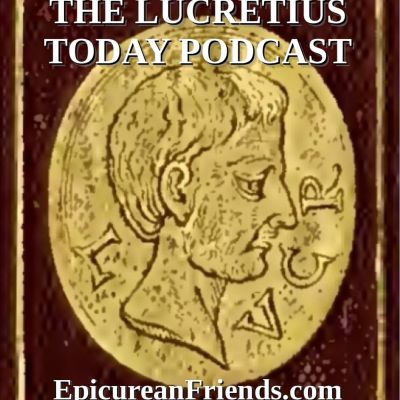Lucretius Today is a podcast dedicated to learning Epicurean philosophy through study of the poet Lucretius, who lived in the age of Julius Caesar and wrote "On The Nature of Things," the only complete presentation of Epicurus' ideas left to us from the ancient world. We'll walk you line by line through the six books of Lucretius' poem, and we'll discuss how Epicurean philosophy can apply to you today. In this podcast we won't be talking about modern political issues. How you apply Epicurus in your own life is entirely up to you. Over at the Epicureanfriends.com web forum, we apply this approach by following a set of ground rules we call "Not Neo-Epicurean, But Epicurean." Epicurean philosophy is not a religion, it''s not Stoicism, it's not Humanism, it's not Libertarianism, it's not Atheism, and it's not Marxism or any other philosophy - it is unique in the history of Western Civilization, and as we explore Lucretius's poem you'll quickly see how that is the case. The home page of this podcast is LucretiusToday...
http://Epicureanfriends.com
Episode 148 - "Epicurus And His Philosophy" Part 04 - True Opinions And False Opinions About Epicurus
Welcome to Episode One Hundred Forty-Eight of Lucretius Today. This is a podcast dedicated to the poet Lucretius, who wrote "On The Nature of Things," the only complete presentation of Epicurean philosophy left to us from the ancient world. Each week we'll walk you through the ancient Epicurean texts, and we'll discuss how Epicurean philosophy can apply to you today. If you find the Epicurean worldview attractive, we invite you to join us in the study of Epicurus at EpicureanFriends.com, where you will find a discussion thread for each of our podcast episodes and many other topics. We're now in the process of a series of podcasts intended to provide a general overview of Epicurean philosophy based on the organizational structure employed by Norman DeWitt in his book "Epicurus and His Philosophy." This week we continue to discuss a series of Points and Counterpoints which Norman DeWitt describes as "True Opinions / False Opinions" about Epicurus:
True Opinions - False Opinions
Epicurus’ View of Truth:
True: Epicurus exalted Nature as the norm of truth, revolting against Plato, who had preached “reason” as the norm and considered “Reason” to have a divine existence of its own. Epicurus studied and taught the nature and use of sensations, and the role in determining that which we consider to be true.
False: Epicurus was an empiricist in the modern sense, declaring sensation to be the only source of knowledge and all sensations to be “true.”
Epicurus’ Method For Determining Truth:
True: Epicurus taught reasoning chiefly by deduction. In this Epicurus was adopting the procedures of Euclid and partying company with both Plato and the Ionian scientists.
False: Epicurus was a strict empiricist and taught reasoning mainly by induction, the truth was that Epicurus' chief reliance was upon deduction.
Epicurus’ As A Man of Action
True: Epicurus was the first missionary philosophy. Epicurus was by disposition combative and he was by natural gifts a leader, organizer, and campaigner.
False: Epicurus was effeminate and a moral invalid; a passivist who taught retirement from and non-engagement with the world.
Epicurus’ View of Self-Interest
True: Epicureanism was the first world philosophy, acceptable to both Greek and barbarian. Epicurus taught that we should make friends wherever possible.
False: Epicurus was a totally egoistic hedonist ruled solely by a narrow view of his own self-interest.
Epicurus Is Of Little Relevance to the Development of Christianity
True: Epicurus reoriented emphasis from political virtues to social virtues, and developed a wider viewpoint applicable to all humanity.
False: Epicurus was an enemy of all religion and there is no trace of his influence in the “New Testament.”
